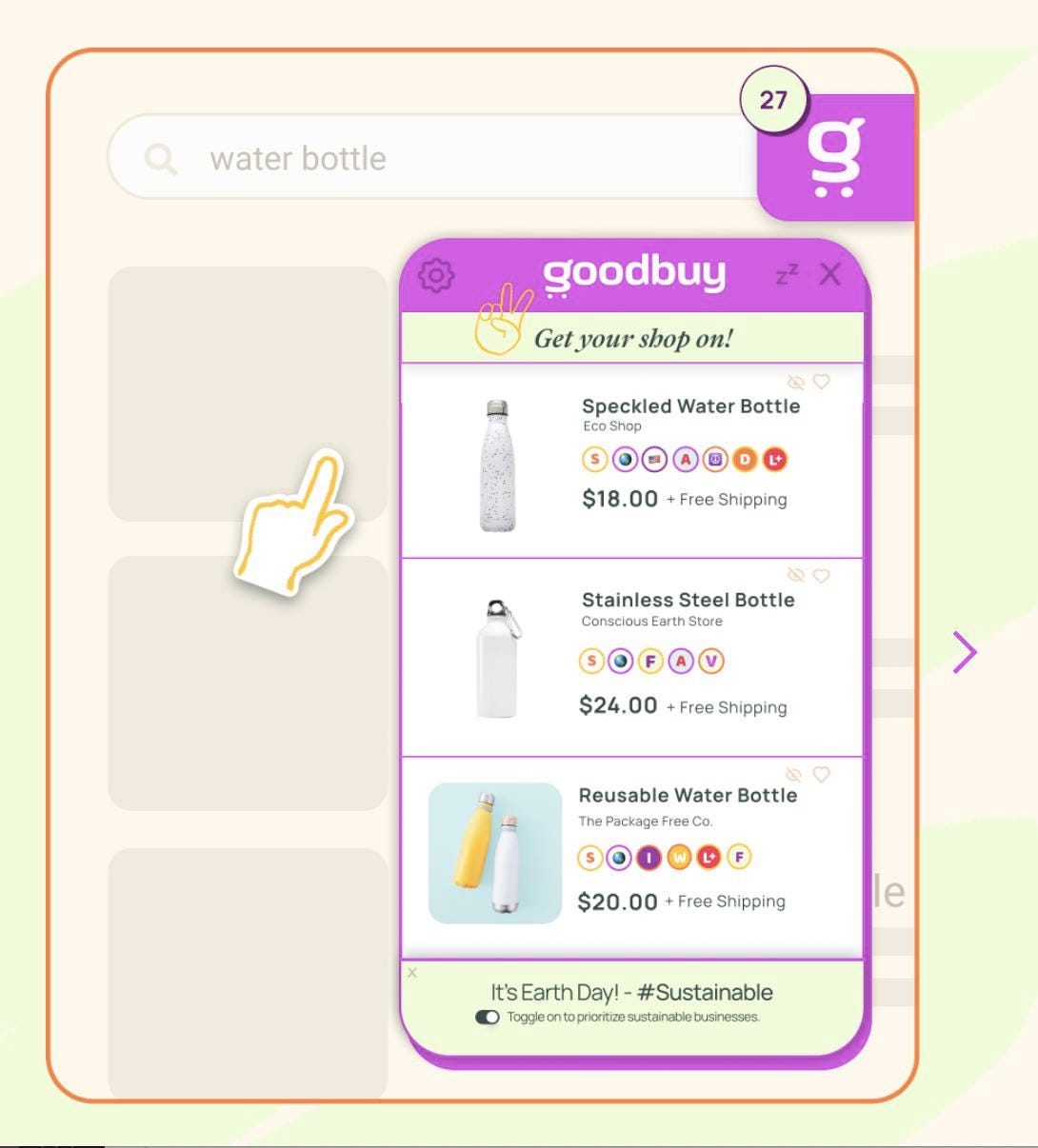
New extension on Chrome hopes to make shopping more consciously easier.
Can you click your way to more conscious shopping?
Two moms, Cara Oppenheimer and Cary Fortin, have created goodbuy, an online marketplace for conscious shopping that claims to have over 19M+ products from 183,000 small businesses. But it’s not your next Amazon. Rather, goodbuy is a chrome browser extension and is on a mission to make shopping “feel good” by making conscious shopping easier online for consumers looking to shop their values and support small businesses, which can be hard to find in the chaos of the Internet.
After downloading the browser extension with Chrome, users can create a profile where they choose from a long list of options: AAPI-owned, American made, Black-owned, Certified Ethical, Cruelty-free, Family-owned, Indigenous-owned, Latina/o/x-owned, LGBTQIA+ owned, Local, Owner(s) with Disability(ies), Sustainable, Vegan, Veteran-owned, and Women-owned. Now, when they shop the Internet, they’ll see results that match these selections.
Cara and Cary break down the finer details of goodbuy and how they’re hoping this simple tool could create impact for thousands of small businesses.
How are you going to deal with the greenwashing that goes on? For example, what are the parameters of “sustainable” and “vegan”?
This is an excellent question and an issue we took to heart from the moment we started building our vetted database. In order to avoid greenwashing and to ensure that we were providing consumers with goods that we can be sure match their values, we rely on well respected third party certifications for these values. So for example, in order for a store to show up as “vegan” in our database, the entire store (not just a line of products) would need to be Certified Vegan or PETA-Approved Vegan. Similarly for a business to be categorized as sustainable, they would need to be certified by a reputable and respected sustainability organization, such as 1% for the Planet, Certified Carbon Neutral, or Rainforest Alliance Certified amongst several others.
How do you as a platform make money?
It was critically important to us to create a mutually beneficial business, where brand profits were tied to the profits of the small businesses on our platform. As such, we make money through affiliate commissions, but unlike traditional affiliates we do not charge setup or monthly fees. In short: we don’t make money from our brands until our brands make money from us.
MORE FOR YOU
How have you financed this venture?
We’re venture capital backed, which has allowed us to focus so deeply on the user experience – to ensure we’re constantly iterating and gathering feedback. It also, to us, was hugely important that we show our children and our community that women, and moms in particular, are this brilliant, underrepresented, overlooked part of our society. Women only received 2% of venture funding in 2021, and all-female founding teams receive even less. But as the pandemic has shown, women are the backbone of our society and deserve the visibility and the financing. Ok, off our soapbox now:)
Does this work on sites like Amazon?
Yes. When someone downloads the browser extension, our shopping tool will pop up to offer small business alternatives on hundreds of sites. This includes the mega mega retailers (the ones with the well known billionaires) as well lots of fast fashion, big box beauty, and major home stores. The benefit to consumers is twofold. The obvious first benefit is that they can choose to support stores that align with their values – local stores, family-owned stores, Black-owned stores, stores with American made products. The really incredible second benefit is the discovery of really amazing, beautiful, interesting, unique products that are different from the ones everyone else has. It’s a way for consumers to explore their own aesthetic while guaranteeing that their coffee table, sneakers, lipstick, beard oil, kid’s lunch box are their own, not the same thing that everyone else already has from Target.
How would you like to refine this as you grow it out? Any shortcomings you’d like to address?
We’re excited to continue to offer up better, more tailored search results for our users. The more times more individuals interact with our tool, telling us what they do and don’t like, the smarter we can get about serving them what they want. At first, we worried that we wouldn’t have enough products to offer consumers. Now, with over 19 million products in our database, we’re clear that our greatest benefit is to offer a curated selection of products — the same as what users are searching for and the unique, funky, cool alternatives from small brands that they’ve never heard of before.
We also acknowledge that a LOT of stores in our database are doing amazing things on the product level and even on the storewide level, just haven’t had the bandwidth or money to apply for third party certifications that are really more aimed at medium to large companies. It’s a process we’re hoping to democratize and make more small business friendly in the not so distant future.





